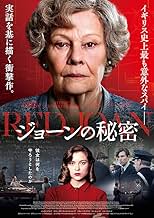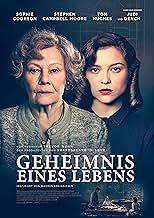Red Joan
- 2018
- Tous publics
- 1h 41m
IMDb RATING
6.4/10
15K
YOUR RATING
The story of Joan Stanley, who was exposed as the K.G.B.'s longest-serving British spy.The story of Joan Stanley, who was exposed as the K.G.B.'s longest-serving British spy.The story of Joan Stanley, who was exposed as the K.G.B.'s longest-serving British spy.
- Director
- Writers
- Stars
- Director
- Writers
- All cast & crew
- Production, box office & more at IMDbPro
Featured reviews
The film as mentioned was extremely interesting but failed to ever really leave 2nd gear the performances was fine and I wasn't bored but it just felt like it could have had another level to it and could really have exploded into action towards the end but continued to plod on at a mediocre pace. Reasonable but nothing special.
If you think you know all there is to know about the spy history since 1945, you will find this film pretty interesting and revealing. i have not heard about the ''granny spy'' until now and its a good melodramatic, historic flick, made for the newest generations.
judi dench does a remarkable appearance in this drama that jumps back and forth in history, the present is spun around police interrogation, and dialouges with her gobsmacked lawyer son, and the past where we follow the main from studies at cambridge into advancing into assistant at the nuclear research institute.
its has some romantic interludes here and there, the way they are made weakens the production, because its not profound enough . the score is classic style british drama series style of music, and gives a nice float to the motion.
its worth a glance thinks the grumpy old man if youre into the war and cold war history, and the keywords are like in many other features to forgive , bow and forget. recommended
judi dench does a remarkable appearance in this drama that jumps back and forth in history, the present is spun around police interrogation, and dialouges with her gobsmacked lawyer son, and the past where we follow the main from studies at cambridge into advancing into assistant at the nuclear research institute.
its has some romantic interludes here and there, the way they are made weakens the production, because its not profound enough . the score is classic style british drama series style of music, and gives a nice float to the motion.
its worth a glance thinks the grumpy old man if youre into the war and cold war history, and the keywords are like in many other features to forgive , bow and forget. recommended
This is what I call a false biopic. These are usually extremely well made movies with good production values, well acted and directed but they also play fast and loose with the actual facts as to make them more "interesting" to the audience. This genre is very popular, especially in the UK, as they are good award bait and popular with the audiences. These are usually never bad movies and I can't really give them a bad rating, but they also almost always leave me a bit flat and, to be honest, I am getting a bit tired of them. So, Red Joan falls in this category and I have nothing more to add about it, except that at least the creators, having changed almost everything regarding the true story, gave us the courtesy of changing the name of the titular character, a move which I think is at least a bit more honest.
Greetings again from the darkness. Sir Trevor Nunn is a Tony Award winner best known for his stage productions, and for being director of the Royal Shakespeare Company from 1968 through 1986. The film is "inspired by a true story", and Lindsay Shapero has adapted Jennie Rooney's 2013 novel, which was a blend of history and fiction taken from the life of Melita Norwood ... the longest serving British KGB spy.
Dame Judi Dench plays Joan Stanley (the movie version of the aforementioned Ms. Norwood) whom we first meet as she is being arrested for treason by MI5 agents in May 2000. Most of the film consists of Joan being interrogated while having flashbacks to her earlier life, beginning in 1938 at Cambridge University. She was a hard-working nose-to-the grindstone Physics student who is drawn in to the fascinating world of Sonja (Tereza Srbova) and her brother Leo (Tom Hughes), who are supporters of the Soviet party. In the flashback scenes, young Joan is played by Sophie Cookson (who reminds of a young Faye Dunaway).
The film spends most of its time in flashback mode, and Ms. Cookson excels as the idealistic Joan first in her scenes with Sonja and Leo, and later with Stephen Campbell Moore who plays Professor Max Davies. Joan is recruited to work in the lab with Davies, as the secretly work to create the Atom bomb. It's Sonja and Leo who coerce Joan into passing along secret documents that allow Stalin's Russia to keep pace on bomb development. She easily flies under the radar since, as Sonja tells her, "Nobody would suspect us. We are women."
From a historical perspective, the film kind of falls flat. It also doesn't qualify as a British spy thriller since there are really no thrills to be found. "The Americans" TV show was infinitely better at the spy genre than this one; however, if the film works on any level, it's as moral debate fodder. Joan clearly has her reasons for doing what she thought was right ... leveling the playing field between super powers, so that none had an advantage. The question is, what is right and who is to decide? During this time, alliances were quite fluid between Russia, Britain and the United States, and she believed her actions saved lives.
Dame Judi is really not on screen much, and when she is, there's little for her to do except play innocent and dream of years gone by. She was labeled "Granny spy", and though her story is interesting, and does provide yet another aspect from WWII, the film itself never really grabs us as viewers. The early periods are well filmed with beautiful costumes and sets, but we are never as dumbstruck as Joan's son (Ben Miles) when he admits he thought his mum was merely an over-educated librarian. As a character study, there's something here ... but as entertainment, it's a bit lacking.
Dame Judi Dench plays Joan Stanley (the movie version of the aforementioned Ms. Norwood) whom we first meet as she is being arrested for treason by MI5 agents in May 2000. Most of the film consists of Joan being interrogated while having flashbacks to her earlier life, beginning in 1938 at Cambridge University. She was a hard-working nose-to-the grindstone Physics student who is drawn in to the fascinating world of Sonja (Tereza Srbova) and her brother Leo (Tom Hughes), who are supporters of the Soviet party. In the flashback scenes, young Joan is played by Sophie Cookson (who reminds of a young Faye Dunaway).
The film spends most of its time in flashback mode, and Ms. Cookson excels as the idealistic Joan first in her scenes with Sonja and Leo, and later with Stephen Campbell Moore who plays Professor Max Davies. Joan is recruited to work in the lab with Davies, as the secretly work to create the Atom bomb. It's Sonja and Leo who coerce Joan into passing along secret documents that allow Stalin's Russia to keep pace on bomb development. She easily flies under the radar since, as Sonja tells her, "Nobody would suspect us. We are women."
From a historical perspective, the film kind of falls flat. It also doesn't qualify as a British spy thriller since there are really no thrills to be found. "The Americans" TV show was infinitely better at the spy genre than this one; however, if the film works on any level, it's as moral debate fodder. Joan clearly has her reasons for doing what she thought was right ... leveling the playing field between super powers, so that none had an advantage. The question is, what is right and who is to decide? During this time, alliances were quite fluid between Russia, Britain and the United States, and she believed her actions saved lives.
Dame Judi is really not on screen much, and when she is, there's little for her to do except play innocent and dream of years gone by. She was labeled "Granny spy", and though her story is interesting, and does provide yet another aspect from WWII, the film itself never really grabs us as viewers. The early periods are well filmed with beautiful costumes and sets, but we are never as dumbstruck as Joan's son (Ben Miles) when he admits he thought his mum was merely an over-educated librarian. As a character study, there's something here ... but as entertainment, it's a bit lacking.
This could have easily be a big + spy story. One of those stories that survive the times because the writers dig behind the veils of historic facts, and make essential values of human existance see the light of day.
That value here is that one human can break through the simplicfied truths of time-bound consciousness, the illusions of wrong and right, dares to think his own moral mind and make a decision that serves humanity on a deeper level of evolution.
It shows as a premise that is strongly tied to the story but not convincingly develloped.
What is left is a skilled and entertaining movie, not a timeless one.
What is left is a skilled and entertaining movie, not a timeless one.
Did you know
- TriviaThe closing credits note the real-life Melita Norwood incident as having "inspired" the film. At the end of this movie, the reporters outside of Joan Stanley's (Dame Judi Dench's) home ask, "How much money did you get?" She answers, indignantly, "Nothing." In reality, Norwood stated, "I did what I did, not to make money, but to help prevent the defeat of a system which had at great cost given ordinary people food and fares which they could afford, a good education, and a health service." (New York Times report 13.9.99.) At that time, the U.K.'s newly elected Labour (Socialist) government under Prime Minister Clement Attlee (shown and played in this movie by Robin Soans), had introduced its first publicly (taxpayer) funded welfare state. On the first day of the new parliament, Labour members sang the socialist anthem the Red Flag.
- GoofsCall boxes from that era had two buttons. 'A' and 'B'. 'A' being pressed if the call is answered and 'B' for return of money if not answered. When Joan makes a call from a public phone box, the person answers the phone and Joan immediately has the conversation without first pressing button 'A'. The person would have been unable to hear her without her first doing that.
- Quotes
Joan Stanley: I was fighting for the living, I loved my country!
- ConnectionsFeatures Le cuirassé Potemkine (1925)
- SoundtracksSweet Serenade
Written and Performed by Geoffrey Peter Gascoyne
Courtesy of KPM Music
Published by EMI Production Music
- How long is Red Joan?Powered by Alexa
Details
- Release date
- Country of origin
- Official site
- Language
- Also known as
- Red Joan: Au Service Secret de Staline
- Filming locations
- Production companies
- See more company credits at IMDbPro
Box office
- Gross US & Canada
- $1,579,730
- Opening weekend US & Canada
- $38,949
- Apr 21, 2019
- Gross worldwide
- $10,647,493
- Runtime1 hour 41 minutes
- Color
- Aspect ratio
- 2.35 : 1
Contribute to this page
Suggest an edit or add missing content










































